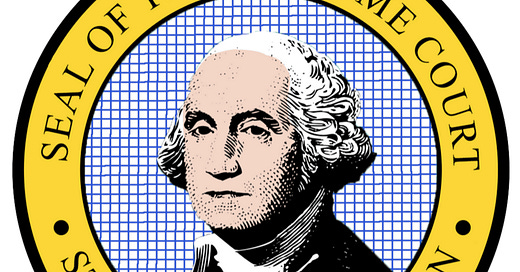Was WA State Supreme Court Biased in Decision Against Seattle Cops?
The Washington (Seattle) State Supreme Court just ruled that the identities of Seattle police officers who attended a political rally in Washington D.C., on Jan. 6, 2021, “should be identified.”
That they issued the decision against cops is not surprising (the decision was unanimous), as one of the bluest courts in the nation. However, their reasoning can’t be right. In fact, this commentary is less about the decision and more about the Court’s reasoning behind it.
The officers argued that releasing their names would invade their privacy, which, whether you agree with the decision or not, does invade their privacy. But, in this case, it appears the Court and decision supporters agree that’s okay—because they’re cops who hold a different political view than they do.
Here’s the first head-scratcher: According to The Seattle Times, “Four Seattle police officers who attended the rally — but who apparently did not enter restricted grounds or otherwise violate the law or Seattle Police Department policy — had sued the city and the Office of Police Accountability to prevent the release of their names and documents relating to an investigation into their activities that day. Two other officers [a married couple] who were terminated for their Jan. 6 actions also sued.”
Continue your head scratching because, despite not violating the law or policy, the Court revealed its partisan hand. It first justified its decision to release thier identities and investigation information because the officers were at a “highly public event.”
Okay, at least there’s a legitimate argument regarding no expectation of privacy while at a public event. But this goes further and the “release of identities” is not incidental, as if their photos had been snapped at an event.
It appears punitive specifically because the court doesn’t like the plaintiff’s political ideology. Since the cops didn’t violate any law or policy, It’s difficult to understanding the “public benefit” the Court claims is at the heart of releasing this information.
Though even the Court agrees the cops are not accused of committing any offenses at the D.C. rally, they appear to consider attending a Republican, President Donald Trump-associated event to be a violation of “something,” justifying releasing their names and investigation details to the public. It appears that the “something” is neither a violation of law, nor a violation of policy, but must be politically offensive to the justices.
Here’s the evidence: Justice Raquel Montoya-Lewis, who wrote the majority opinion, said, “off-duty acts of a police officer can be disclosable if their actions’ bear upon (their) fitness to perform public duty’ because ‘privacy considerations are overwhelmed by public accountability.’”
Is the Washington State Supreme Court saying that cops attending a public, permitted rally held by one of the two major political parties (the one holding the U.S. presidency at the time), while not breaking any laws or violating any policies, are “actions [that] bear upon (their) fitness to perform public duty…?”
Why? Is it because they don’t like their political leanings? It seems so.
She described that the officers’ lawful, constitutionally protected actions somehow require “public accountability,” which “overwhelms” the officers’ “privacy considerations.” In this case, that means releasing their personal information to the public because their political activities offended the state supreme court.
In other words, we’re Democrats, and we don’t like Republicans or Trump supporters, especially if they are law enforcement officers. Therefore, even though they’ve done nothing illegal or that violated city or department policy, we are effectively punishing them.
And here’s a rancid, cynical cherry on top of this toxic sundae: The case will now return to the lower court for a probable release of the officers’ information. But before the final decision has officially been made, though the officers have been suing under the names John and Jane Doe (to protect their privacy), the Court found anonymity is no longer necessary, and the officers must use their real names at trial.
So, technically, there is no final decision from the lower court, and I’m thinking the officers could still appeal the state court’s decision to a federal court. So, wouldn’t the Court’s action, making it moot and contaminate any appeal?
These folks are such transparently petty people who live in such a dense political bubble that they don’t even see their own bias while conducting lawfare against cops.





